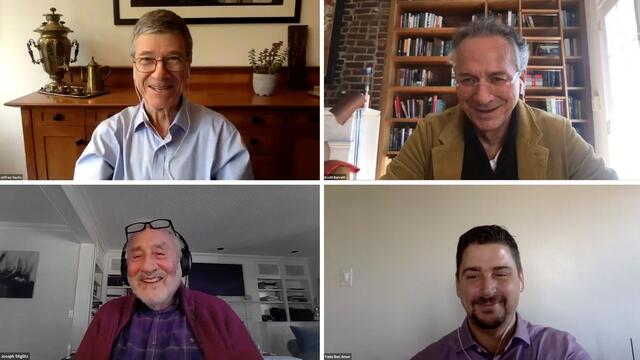
Seminar Explores Multidisciplinary Responses to COVID-19

“The world faces its greatest crisis since World War II and its greatest economic calamity since the Great Depression,” Jeffrey Sachs, University Professor, has said of the effects of COVID-19.
Along with SIPA’s Vice Dean Scott Barrett and Yanis Ben Amor, adjunct professor at the Mailman School of Public Health, Sachs co-hosts COVID 19: Policymaking in the Throes of a Global Crisis, a semester-long webinar series. They hope the ongoing dialogue will illuminate interrelated dimensions of the pandemic as they unfold and shed light on practical solutions to overcome it and rebuild the world economy in an inclusive and sustainable way.
Sachs, who is also chair of the Lancet COVID-19 Commission task force, notes that while the virus is particularly challenging due to its high transmission rate, patchwork responses to it have exacerbated the difficulties. In the United States, in particular—where over 230,000 people have perished since March (representing nearly 25 percent of total fatalities worldwide)—non-pharmaceutical interventions such as testing, contact tracing, social distancing, and face masks have only sometimes been underpinned by science.
How is it that a global pandemic response has become hyper-politicized and lacking in its trust of scientific data? And how can we come together to define and execute effective, centralized solutions? Each week, Sachs, Barrett, and Yanis Amor tackle these questions with help from guest panelists from across disciplines—public and environmental health, international finance and economics, and governance reform.
One key takeaway from the series is that we cannot reform the economy or any other sector of society until the public-health crisis—and the related humanitarian crises of hunger and mental health—is under control. Asian Pacific countries like South Korea, Taiwan, and New Zealand have touted exceptionally low transmission rates and deaths. So, what is keeping the United States from following suit?
Spotty leadership, says Barrett.
“Each of us as individuals must play our part, particularly our leaders,” he says. “We look to them to establish a norm of behavior that inculcates a sense of duty and obligation with other members of society.”
Barrett adds that despite the highly politicized nature of the pandemic and stunning vilification of scientists in the United States—like the director of the National Institute of Allergy and Infectious Diseases, Anthony Fauci—there is still widespread trust in the integrity of our institutions.
The COVID crisis, says SIPA’s Robert Shapiro, is exacerbated by partisan politics. “Elections have real consequences, especially when you have one party in dominant control of government,” he says, citing President Trump’s divisive handling of the pandemic response.
“There is an opening here,” adds Barrett of how our current political moment could result in meaningful change. “You would want to have legislation that Congress can say yes to, so you actually have a law—you want that to be something that can be implemented and not reversed.”
Only with confidence in and robust public-health measures can we begin to emerge from this crisis and see an economic recovery for everyday households. Also necessary, adds SIPA’s Suresh Naidu, is continued government assistance for those whose livelihood was impacted by the pandemic.
In a webinar dedicated to worker health and safety, Naidu discusses how the United States’ unemployment insurance stimulus through the CARES Act was critical in avoiding a deeper recession in the pandemic’s early months. A fall in aggregate demand throughout the economy is imminent, he says, as laid-off workers’ savings have run dry since unemployment benefits were halted in July.
Foundational issues with the U.S. labor system such as optional health and unemployment benefits exacerbate current conditions and must be reformed if we’re to see long-term economic improvements in equity, adds University Professor Joseph Stiglitz, who joined the seminar to discuss the macroeconomic effects of COVID. Widening income inequality troubles the Nobel laureate.
“Targeted, visionary spending can help our economy come back from this pandemic while making it more knowledge-based, greener, and more equal,” says Stiglitz. “We cannot be afraid of spending on solutions right now, but we must allocate them to be benefit multipliers. Half a bridge is just that; it doesn’t get you anywhere.”
If the COVID crisis has taught us anything, it’s that borders are quite meaningless, at least to pathogens. Yet what we’ve witnessed, according to Barrett, is a largely nationalistic reaction from countries, epitomized by a U.S. withdrawal from the World Health Organization in the middle of a global pandemic.
“I think there are lots of ways in which [the United States] can bring the world back together, but it's not going to be an immediate process,” Barrett says. “We have a remarkable opportunity here to get the world to work together to protect the whole world. We're all integrated into a common global system. And we need to adopt approaches that will be effective for our own people, because they're also effective for others who are all interlinked.”
While this pandemic is unique in many ways, it is not the first or last of its kind. We must use the lessons learned to instill transparency and science-backed credibility across our public policies.
As emphasized by Sachs: “We need transparency, evidence, and scientific credibility around our public policies, and not only for COVID-19 but also for climate change, environmental sustainability, the fight against poverty, and other societal challenges.”
COVID-19: Policymaking in the Throes of a Global Crisis continues each Wednesday through December 9. Visit the seminar website to register for upcoming events and view recordings of past webinars.
— Christina Sewell MPA ’21